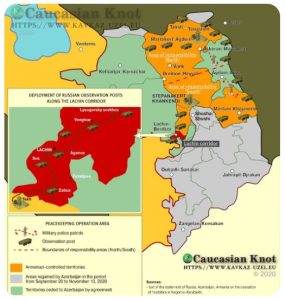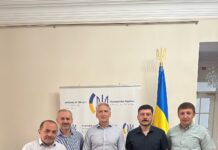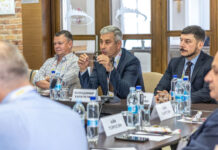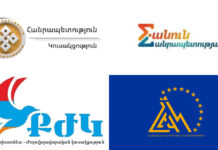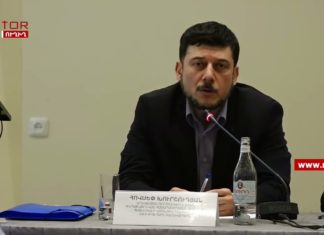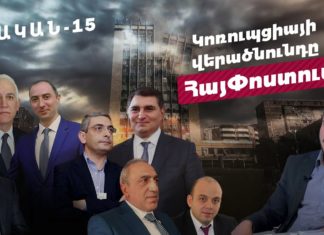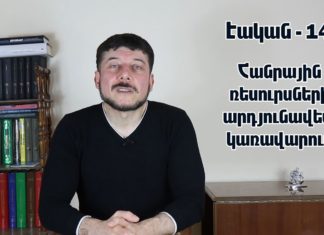23 December 2022, Brussels
For more than a week the situation in the Lachin corridor remains extremely tense and complicated. A group of Azerbaijani citizens who call themselves ecological activists have blocked the Goris-Stepanakert highway, the only road connecting Nagorni Karabakh with Armenia and the outer world. Throughout the past days, the statements of the Azerbaijani authorities, as well as the activities of the “activists” have made it obvious that the so-called “ecological action” initiated by Aliyev’s regime is not anyhow related to ecological issues. The mentioned corridor is the only connection vitally important for Armenians of Nagorno Karabakh since the alternative road Mardakert-Vardenis through the Kelbajar district of Azerbaijan, is blocked by Azerbaijani troops after 9 November, 2020, similar to the air connection, as stated on several occasions by the Ilham Aliyev, regardless of whether it is military or civilian aircraft which is headed from Armenia to Stepanakert, the capital of Nagorno-Karabakh, will be shot down by the air defense forces of Azerbaijan.
Despite the growing concerns across the world and the statements of the representatives of the international community, such as the UN, the EU, the US, France, the UK, Canada, the Netherlands, Lithuania, Estonia, Greece, Cyprus, and many others, as well as international humanitarian and HR organizations, Aliyev continues the blockade which is a bright illustration of the essence of the anti-democratic and inhumane regime that currently holds power in Azerbaijan. The fact that the gas pipeline which was also blocked by the Azerbaijani side was finally opened as a result of international pressure, proves that the action follows the aim to intimidate the population of Nagorno Karabakh and to blackmail the Armenian side during the negotiations.
This is not the only case of such behavior of Aliyev and his regime, the blockade of the gas pipeline at the beginning of 2022, the rejection to release the prisoners of war and using them as hostages in negotiations, as well as refusing to withdraw the troops from Armenian territories despite the calls and concerns of the international community are a clear illustration of the entire logic behind the behavior of the regime.
Unfortunately, the blockade of the Lachin corridor is already causing severe consequences for around 120,000 Armenians of Nagorno Karabakh. The shortage of gas, supplies, and medications turns the normal life of the Armenians into survival in the conditions of the blockade. On 19 December the impossibility of transportation of a patient in critical condition to Yerevan for better medical treatment caused his death. As reported by the authorities of the unrecognized republic there are other critical patients in need of proper medical treatment, among them children, who still need to be transported to Yerevan.
The described situation illustrates that the threat to the population of the Nagorno Karabakh is existential, the actions are planned by the political regime of Azerbaijan and there is a need for consolidated effort in ensuring the security of the Armenians of Nagorno Karabakh.
The Co-Chairs of the EaP CSF Steering Committee makes the following appeals.
To the authorities of Azerbaijan:
- Immediately open the Lachin Corridor and refrain from actions aimed at undermining the functioning of transport and energy communication connecting Armenia with Nagorno Karabakh in the future, which may cause a humanitarian catastrophe in the latter;
- Stop the rhetoric of hatred and threats of force against the Armenians of Nagorno Karabakh and Armenia, solve all existing problems related to the status of Nagorno Karabakh exclusively by peaceful methods, through negotiations with the authorities of Nagorno Karabakh, through the facilitation of international mediators;
- Release all Armenian prisoners of war and other detained persons, as stipulated in the tripartite declaration dated 9 November, 2020;
- Withdraw Azerbaijani troops from the territory of Armenia, which will significantly de-escalate the situation on the Armenian Azerbaijani border;
- Support the activities of the civil society of Azerbaijan in establishing a dialogue with its partners in Armenia and Nagorno Karabakh, for the speedy establishment of mutual trust and conditions for long-term peace in the region;
- Start investigation of war crimes committed by Azerbaijani servicemen both during the 2020 war and during the escalation on 12-14 September this year, including the ones captured on videos.
- Continue negotiations to reach a peace treaty within the framework of the Prague format.
To Armenia
- Continue investigation of war crimes committed by Armenian servicemen both during the 2020 war and during the escalation on 12-14 September this year, including the ones captured on videos.
- Support the activities of the civil society of Armenia in establishing a dialogue with its partners in Azerbaijan, for the speedy establishment of mutual trust and conditions for long-term peace in the region.
To the EU leadership:
- Start direct interaction with civil society organisations of Nagorno Karabakh, including environmental organisations, for the purpose of international monitoring of the situation at mining enterprises of Nagorno Karabakh;
- Use the influence on the authorities of Azerbaijan and Armenia to achieve the replacement of the Russian “peacekeeping forces” with the international peacekeeping forces of the OSCE, which will have the mandate of the UN;
- Extend the monitoring mission of EU civilian observers in Armenia, on the border with Azerbaijan, and increase its number and reinforce its technical capabilities. Through negotiations with the authorities of Azerbaijan – to achieve an agreement on the deployment of a similar mission also in Azerbaijan – on the border with Armenia;
- Use the influence on Azerbaijan to resume negotiations to reach a peace treaty between Armenia and Azerbaijan within the framework of the Prague format, which Aliyev refused to do.
Co-Chairs of the Steering Committee of the Eastern Partnership
Civil Society Forum
